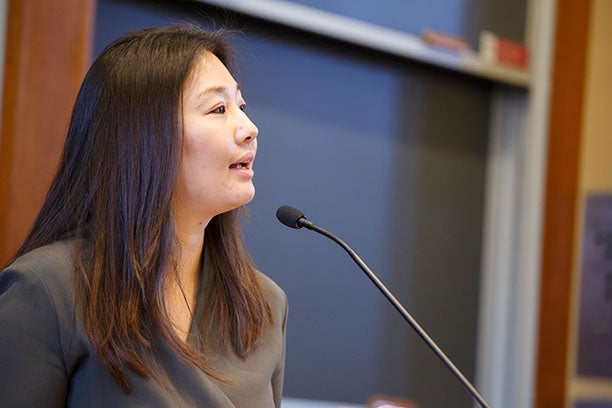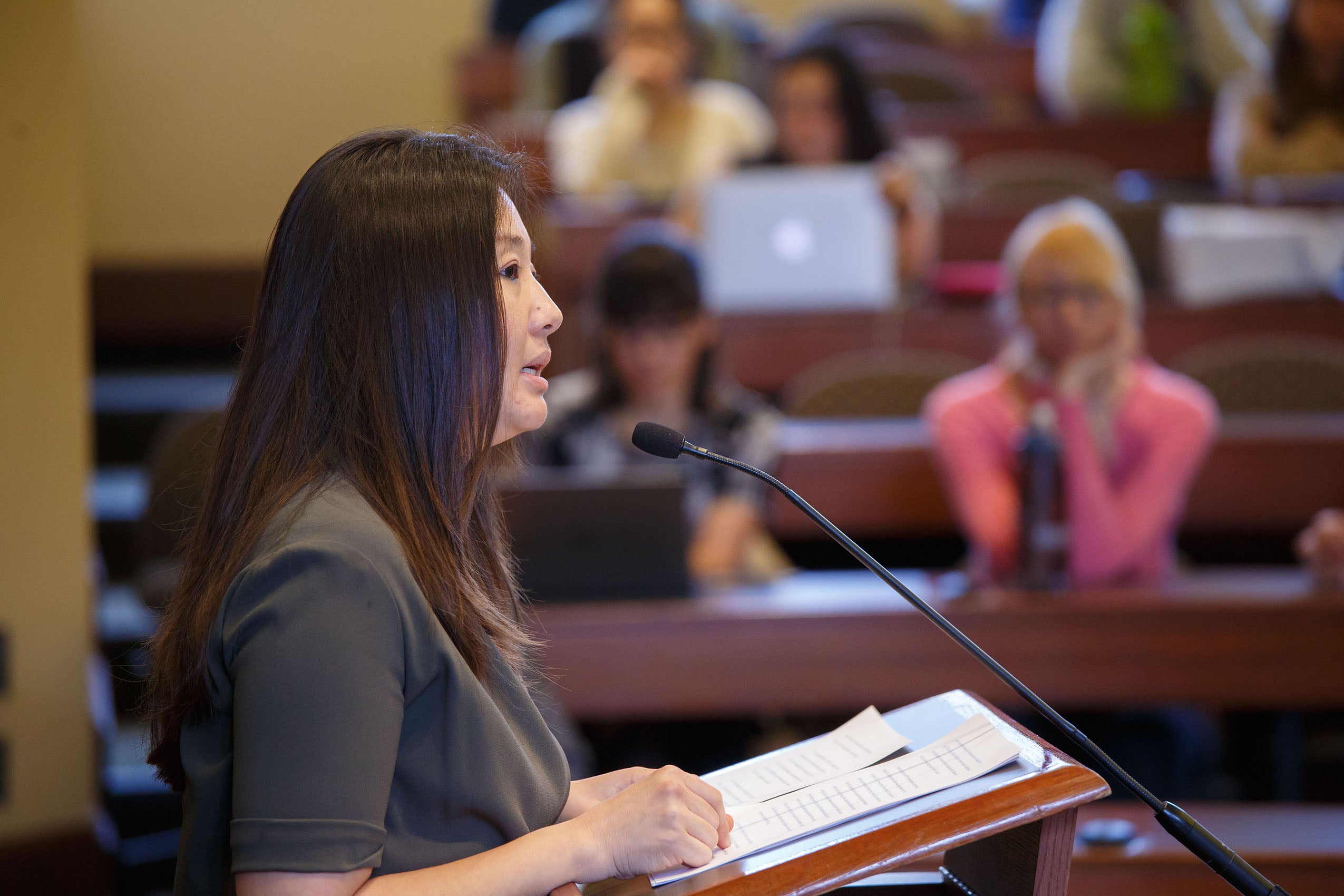“You have contributed so much to this school, and I sincerely hope that we have done you more good than harm,” Professor Jeannie Suk told the audience on February 29, as she kicked off the “Last Lecture Series” for the Harvard Law School Class of 2016. Organized by the Class Marshals, the series asks popular HLS professors to give a lecture as if it were their last opportunity to address the graduating class. Professors Annette Gordon-Reed, Robert Sitkoff, and Robert Bordone ‘97 will round out the rest of the four-part series in lectures later in the semester.

Joking that colleagues who saw the advertisement for her Last Lecture have asked if she has a terminal illness or is leaving to teach at Stanford, Suk said, “The reality is, I am going to die in this job, but hopefully not for a very long time. And from here I will experience vicariously, and with pride, the things that you all are doing to live greatly and contribute to our world.”
Suk began the lecture by sharing how her background has shaped her academic interests. “Many of you know that I don’t allow personal narratives in my classes, but one of the class marshals told me that I have to do some personal narrative in this lecture,” Suk said. She described her family’s harrowing escape from North Korea to South Korea during the Korean War. “It is possible that because trauma infused my family so deeply—my family’s entire existence was shaped by it during my childhood—that in my scholarly career, I became so fascinated with the phenomenon of trauma, of its uses and its abuses, its meanings and its consequences.”
Her family’s background also inspired her to study “the related concept of home,” Suk said. She characterized as “the most formative experience of [her] life” the challenges she faced when she first moved to Queens as an immigrant schoolchild with little knowledge of English, a problem compounded by the fact that her traditional parents discouraged her from speaking at home.
The experience of finding her voice has been a strong influence on her approach to learning and teaching, she said, and she still accesses those memories of disconnection to teach others “who don’t have voice” to be “fluent” in communicating with each other and the world. “To be connected to others—through language, and in the face of fear—has been a guiding principle in my life as a teacher,” she said.
Impeccable technique, skills, and even artistry are not enough,” Suk said. “You must challenge the way things are, and imagine a world that is better, and require a way of doing law that is better.
Invoking the words of George Balanchine, the founder of the School of American Ballet (SAB), Suk described education as essential for change. Suk, who attend the SAB, said that when asked to establish a ballet tradition in the United States, Balanchine was reported to have responded, “But first, a school.”
“A school is the foundation for society, its practices and its norms, and its aspirations,” Suk said. “In the classroom, I have tried to teach you the awesome responsibility and power you will have as some of the most influential legal actors in the world. You are people who will change our world, who will evolve the way we think and change this world’s future.”
“Impeccable technique,” skills, and even artistry are not enough, Suk said. “You must challenge the way things are, and imagine a world that is better, and require a way of doing law that is better.”
Legal education is not a credential or a pedigree, but a “profound intellectual and socializing process,” she said.
“If you haven’t had the experience of doubting first principles, being provoked and disturbed, and angered—we haven’t done our job here. If you haven’t dissected the structures of power, authority, and legitimacy, and meaning that underlie our society—we have not done our job here,” Suk said. “The ability to do that is what makes the job of a lawyer so fundamental in our society. And rather than teach you what the law is, we should be teaching you how to think about problems that don’t have answers yet.”
Suk warned against merely falling back on “mimicry or repetition.” Students may look up to their professors, “but there’s a reason we teach you through questions, not answers.”
The most upsetting moments for her as a teacher, Suk said, often occur in the second semester of the first year, “when you ask a student, ‘is this a just result?’ and they don’t know what to say. Or ‘what is at stake in this case?’ Or ‘what should the law be?’ Or ‘what is the morality of this position that you see represented?’”
“When a student just answers these questions by pointing me to words in a case or previous cases, then I know that there’s something about the way our first-year education works that is not quite right.”
“It’s not an exaggeration to say that our law school is directly connected to the heart of this society, and I’m going to press you on your responsibility to serve the world and to question it and to change it,” Suk said.
“Students are what make this school’s aspirations real,” and Suk said this class is graduating into “a world on fire.” She credited the Class of 2016 with living its legal education “in true counterpoint with the social problems and social injustices surrounding us, problems that fundamentally indict our law and call for critique of the way that you have been taught to think here in these halls.”
“You have pushed this faculty to think harder and do better,” Suk said. She described how this graduating class has helped the faculty see that there is “no excuse for not exposing and confronting law’s role in creating and bolstering the very problems of inequality, of life and death, that have moved you to action in the past several years.”
In the closing minutes of her lecture, Suk gave advice based on lessons she has learned over the years. She said she was “liberated” by the process of giving up her “perfection complex” as a young professor—a process helped along by an incident where, as she was rushing to class, she fell on her face in front of a lecture hall full of students.
“I have made peace with being criticized and disagreed with,” by realizing that “not everybody’s going to love you; not everybody’s going to think you’re good.” It is most important to “listen to your heart in looking for and engaging in work that you love to do,” she said.
“You should accept your needs. And don’t feel badly about fulfilling them. I need to get eight hours of sleep a night,” Suk said. “I probably would’ve written a lot more and been more productive if I only needed six hours—but I need eight, and I take eight hours.”
Noting that she buys herself flowers when she finishes writing something, Suk reminded the audience to “give yourself rewards when you meet certain goals.”
Finally, “since no speech by a Korean law professor would be complete without an Irish blessing,” Suk said, to laughs in the audience: “May the road rise to meet you, may the wind be always at your back, may the sun shine warm upon your face, and rains fall soft upon your fields, and until we meet again, may God hold you in the palm of His hand.”
